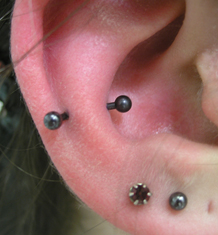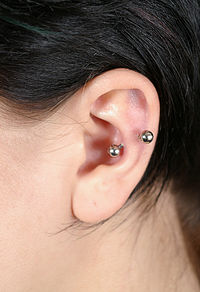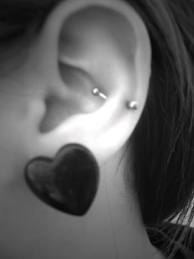Want to step up your appeal with a cool piece of ring on your ear? The easiest way of doing so is getting a Snug Piercing but it is important that you know about the process before you actually go for it.
What is a Snug Piercing?
Page Contents
- 1 What is a Snug Piercing?
- 2 How Snug Piercing Is Done?
- 3 Snug Piercing Aftercare
- 4 Snug Piercing Infection
- 5 Snug Piercing Migration
- 6 Snug Piercing Rejection
- 7 Does Snug Piercing Hurt?
- 8 Snug Piercing Dangers
- 9 How Long Does A Snug Piercing Take To Heal?
- 10 Snug Piercing Jewelry
- 11 How Much Does A Snug Piercing Cost?
- 12 Snug Piercing Pictures

Picture 1 – Snug Piercing
Source – 3fatchicks
Snug Piercing simply means the process of making a perforation in the snug, a spot in the middle position of outer ear ring, a little above the anti-tragus. The snug is a thin, shallow region of the cartilage which makes it easily to be pierced.
Snug Ear Piercings are mainly done to let the piercee wear a piece of jewelry on the ear. It is also known as Antihelix Piercing.
How Snug Piercing Is Done?
Show the piercer where you want to have the perforation. The professional will probably mark the entry and exit points with a surgical marker. Ask the person if he/she is using sterilized needles. You have a right to know about your safety. Proceed only if you are fully satisfied. Else, walk out of the place.
Next, an anesthetic injection will be administered to your snug. This does not hurt more than a gentle sting. The area will be cleaned with a disinfectant solution.
The actual piercing will then be carried out. Under anesthesia, you will not feel any pain. The needle will soon penetrate your flesh and come out of it. The jewellery will be immediately inserted into the pierced region. There will be a little bleeding which the piercer will clean away. Another round of cleaning will follow.
Snug Piercing Aftercare
Snug Piercing care mainly consists of cleaning the recently pierced snug using saline solution. Make a solution using 1-2 tsp of salt and 8 ounces (1 glass) of water. Make small cotton balls. Soak one of them into the salt-water solution. Sit before a mirror and press the ball against the snug and rub very gently to wash away any dirt or germ. Throw it away and take another one. Repeat the process for another 4 minutes.
Perform the salt water cleaning session 2-3 times every day.
Snug Piercing Infection
It is essential to clean and care after a pierced snug properly. Absence of Snug Piercing care lets dirt and germs settle and persist in the region inviting bacterial infection. An infected snug can result in redness in the entire ear. The whole upper ear appears inflamed. The Snug Piercing swelling is accompanied with watery discharge.
In extreme cases, Snug Piercing bumps are filled with pus. It is necessary to seek professional medical care even before Snug Piercing lumps arise.
Snug Piercing Migration
If not perforated properly, the pierced spot can move from its actual position and settle somewhere else on the ear taking the jewelry along. Apart from improper perforation, use of a bigger jewelry and lack of good aftercare may also cause Snug Piercing Migration.
Snug Piercing Rejection
Improper piercing, incompatibility of the skin with the metal of the jewelry and absence of care or irregular aftercare can also lead to ‘rejection’ of the jewelry. In such cases, the body reacts against the jewelry. The skin pushes the Snug Piercing ring out making it fall away eventually.
Does Snug Piercing Hurt?
Snug Piercing pain is usually very sharp. The threshold for pain varies from person to person and if you have a low endurance level, it is better that you rub the snug with ice before it comes in contact with the surgical needle. However, most piercing studios use anesthetic solutions like Benzocaine on the snug before perforation. So there will not be much pain with the anesthesia. Your concern will be the anesthetic injection which does not hurt more than a mild sting.
Snug Piercing Dangers
Some of the main Snug Piercing complications are
Infection
Not caring for the snug properly after piercing can result in infection. An infected snug suffers from redness, swelling and watery discharge. In extreme cases, pus-filled lumps can arise in the region. It is advisable that you carry out the piercing from a reputed studio and look after it well afterwards. These simple steps can help you avoid infection.
Trauma
Trauma or injury to the just pierced snug can cause a tear in the area. Injury can also arise if the snug suffers due to harsh sports activities. A tear can also happen if the end of the jewellery catches a towel and suffers a pull. It is advised to avoid all harsh activities for at least a month or until the snug heals a little. You should also avoid sleeping on the pierced side to avoid a rejection or migration.
Irritation
Often there is an irritation in the snug due to use of strong hair gels, hair sprays or soaps. If you experience similar symptoms due to same causes, you should switch to a mild brand.
The piercer will then give you the aftercare instructions. You will probably be handed a manual filled with directions on how to look after the pierced region.
How Long Does A Snug Piercing Take To Heal?
A pierced snug heals itself roughly in a time period of 8-10 weeks. Complete Snug Piercing healing time is approximately a year or a little more. In most people, Snug Piercing healing process takes about a year.
Snug Piercing Jewelry
A Snug Piercing Jewelry comes in varied shapes and sizes. They are made of different metals. There are silver suds, circular cone bells, steel ball rings and gold plated Snug Piercing bars/barbells. Piercers normally use a curved titanium barbell with a 1.6 mm (14 gauge) size.
How Much Does A Snug Piercing Cost?
A session of Snug Piercing costs about $20-$35. With the jewellery included, Snug Piercing price is somewhere around $50.
Snug Piercing Pictures
Want to know how a pierced snug looks like? Check out these Snug Piercing images to get an idea about the appearance of a perforated snug.

Picture 2 – Snug Piercing Image
Source – wikimedia

Picture 3 – Snug Piercing Photo
Source – photobucket
If you are serious about a Snug Piercing experience it is better that you get it done from a good professional studio. Trying one at home with limited knowledge is never advisable as it may cause actual bodily harm. It is always better to go for a professional hand where your safety is concerned. But if you are quite expert in body piercing, you can of course try it yourself.
References:
http://en.wikipedia.org/wiki/Snug_%28piercing%29
http://piercingshq.com/snug-piercing/
http://greatpiercingshop.com/blog/snug/
http://www.buzzle.com/articles/snug-piercing.html
http://bodyjewelleryshop.blogspot.com/2008/09/diary-of-snug-piercing-and-healing.html

Mine took over a year and a half to heal and it caused muntiple bumps that had to be painfully popped and it caused a random sore bloody bump on the back of my ear. Make sure the jewelry isn’t snug or almost snug to your ear when you get it pierced because you need a lot of room for bumps and swelling. Do not get the giant balls like the picture because that isn’t good either. It is the most painful ear piercing to get.